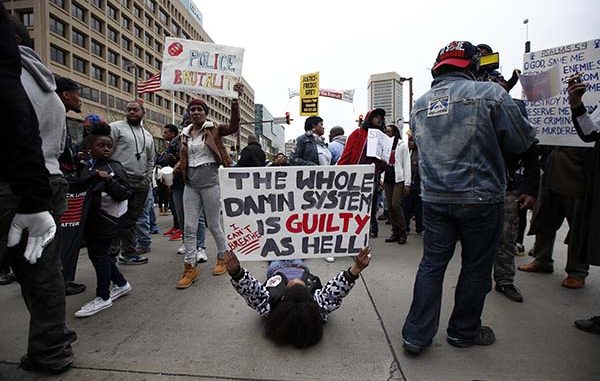
The Gun Trace Task Force of the Baltimore City Police Department (BPD) was a special unit organized officially to get guns off the streets and prevent violence. But eight of the nine members of the Task Force were charged with a variety of crimes. Six pleaded guilty and two others were convicted of crimes, including using their power as cops to rob people of cash, drugs, and jewelry, planting toy guns as fake evidence when they killed someone who was unarmed, charging the city for overtime when they weren’t working, and other kinds of racketeering.
This corruption scandal follows Freddie Gray’s murder while in police custody in 2015 and the subsequent Justice Department investigation that found extreme racial discrimination in the BPD’s practices. The Justice Department’s findings detailed racial disparities “at every stage of [BPD’s] enforcement actions,” showing constant violations of African Americans’ civil rights. These included “(1) making unconstitutional stops, searches, and arrests, (2) using enforcement strategies that produce severe and unjustified disparities in the rates of stops, searches and arrests of African Americans, (3) using excessive force, and (4) retaliating against people engaging in constitutionally-protected expression.” So people in Baltimore don’t trust the police and fear them for good reason. Among the specific findings:
- “African Americans accounted for 95% of the [pedestrians] BPD stopped at least ten times. One African American man…was stopped 30 times in less than four years… None of the 30 stops resulted in a citation or criminal charge.”
- “African Americans accounted for 82% of all BPD vehicle stops, compared to only 60% of the driving age population in the city and 27% of the driving age population in the [region].”
- “[We found] large racial disparities in BPD’s arrests for drug possession… While African Americans use drugs at rates similar to or slightly exceeding other population groups, BPD arrested African Americans for drug possession at five times the rate of others.”
These are just the tip of the iceberg of the 163-page report. Why is this so rampant? Is it racism? Yes, in part. But many of the cops involved in the mistreatment of Blacks in Baltimore have themselves been African American. While Baltimore’s experience may seem off the charts, it is representative of police crimes nationally. Black people are three times more likely to be killed by police than white people. Less than one-third of Black people killed by police in 2014 were suspected of a violent crime and allegedly armed. In 99% of such cases in 2015, the cops were not convicted. We have to ask what else in police culture contributes to cops’ crimes?
The official role of police is supposedly to protect “law and order.” But whose law and what order? They are supposed to “protect and serve.” But protect and serve whom? Do they protect working people from losing their jobs when a corporation automates those jobs out of existence? No. Do they stop landlords from raising rents? No. Do they stop insurance companies from gouging us on healthcare? No.
The old expression is that “possession is nine-tenths of the law,” meaning that under this economic system property “rights” are more important than other human needs, including life itself. The law says that capitalists can make people work long hours under brutal conditions if the workers let them get away with it – all to make the most profits. In this corrupt and violent system, is it any wonder that police brutality is rampant and so many officers are corrupt?

